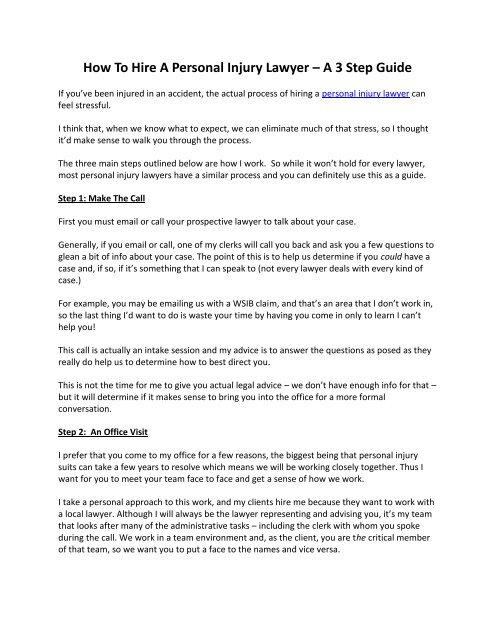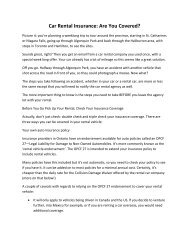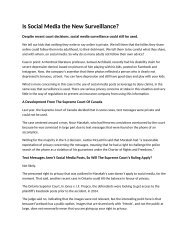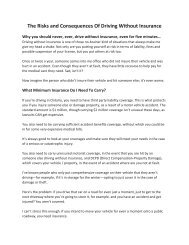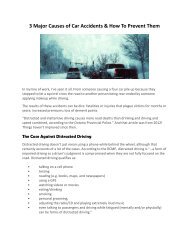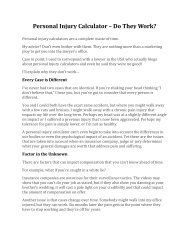How To Hire A Personal Injury Lawyer – A 3 Step Guide
Derek Wilson Law guides you with the easiest 3 steps for hiring personal injury lawyer. We don’t pressure you to sign any kind of retainer. More info - http://derekwilsonlaw.ca/hire-personal-injury-lawyer-3-step-guide/
Derek Wilson Law guides you with the easiest 3 steps for hiring personal injury lawyer. We don’t pressure you to sign any kind of retainer. More info - http://derekwilsonlaw.ca/hire-personal-injury-lawyer-3-step-guide/
You also want an ePaper? Increase the reach of your titles
YUMPU automatically turns print PDFs into web optimized ePapers that Google loves.
<strong>How</strong> <strong>To</strong> <strong>Hire</strong> A <strong>Personal</strong> <strong>Injury</strong> <strong>Lawyer</strong> <strong>–</strong> A 3 <strong>Step</strong> <strong>Guide</strong><br />
If you’ve been injured in an accident, the actual process of hiring a personal injury lawyer can<br />
feel stressful.<br />
I think that, when we know what to expect, we can eliminate much of that stress, so I thought<br />
it’d make sense to walk you through the process.<br />
The three main steps outlined below are how I work. So while it won’t hold for every lawyer,<br />
most personal injury lawyers have a similar process and you can definitely use this as a guide.<br />
<strong>Step</strong> 1: Make The Call<br />
First you must email or call your prospective lawyer to talk about your case.<br />
Generally, if you email or call, one of my clerks will call you back and ask you a few questions to<br />
glean a bit of info about your case. The point of this is to help us determine if you could have a<br />
case and, if so, if it’s something that I can speak to (not every lawyer deals with every kind of<br />
case.)<br />
For example, you may be emailing us with a WSIB claim, and that’s an area that I don’t work in,<br />
so the last thing I’d want to do is waste your time by having you come in only to learn I can’t<br />
help you!<br />
This call is actually an intake session and my advice is to answer the questions as posed as they<br />
really do help us to determine how to best direct you.<br />
This is not the time for me to give you actual legal advice <strong>–</strong> we don’t have enough info for that <strong>–</strong><br />
but it will determine if it makes sense to bring you into the office for a more formal<br />
conversation.<br />
<strong>Step</strong> 2: An Office Visit<br />
I prefer that you come to my office for a few reasons, the biggest being that personal injury<br />
suits can take a few years to resolve which means we will be working closely together. Thus I<br />
want for you to meet your team face to face and get a sense of how we work.<br />
I take a personal approach to this work, and my clients hire me because they want to work with<br />
a local lawyer. Although I will always be the lawyer representing and advising you, it’s my team<br />
that looks after many of the administrative tasks <strong>–</strong> including the clerk with whom you spoke<br />
during the call. We work in a team environment and, as the client, you are the critical member<br />
of that team, so we want you to put a face to the names and vice versa.
Once we’re face to face, I’m going to ask you a lot of questions. I’ll ask you for an update on<br />
how you’re feeling, what’s going on with you/your life/your injury and any actions you’ve taken<br />
to date.<br />
<strong>To</strong>gether we will decide if it makes sense to move forward. Either way, it’s my job to make sure<br />
that you are crystal clear about what I can and can’t do, how things work, and what we each<br />
need to do to make your case successful, should we move forward.<br />
<strong>Step</strong> 3: Sign the Retainer<br />
Finally, if I feel that you do have a case, I will walk through how the actual process works.<br />
For example, it’s important that my clients take my advice to heart. This means acting on it and<br />
following through. Everything from attending doctors’ appointments to filling me in when<br />
something changes (for example, your newfound ability to cut your lawn without pain, or a<br />
deterioration in your condition rendering you incapable of cutting the lawn.)<br />
As much as you are interviewing me, I am also interviewing you. You see, personal injury<br />
lawyers only get paid if their clients get paid. This is a true partnership. Expect me to be very<br />
clear with you not only about how I can help you, but also how you can help me to help you,<br />
namely your obligation to focus on your health and keep me informed.<br />
If you’re comfortable with what I’m saying to you, this is when I ask you to sign a retainer.<br />
Retainers are important because they give me the ability to contact others in your name to<br />
collect more information so that I can build your case.<br />
Whether to sign a retainer is 100% up to you. There should never be pressure. If, by the way, a<br />
lawyer pressures you sign a retainer, consider it a red flag. But in terms of our relationship, this<br />
is the point where I continue researching and advising for you only if you are my client.<br />
Finally, if you do sign the retainer, no money is exchanged. This is a big area where most<br />
(although not all) personal injury lawyers differ from their counterparts in other areas of law.<br />
<strong>Personal</strong> injury lawyers get paid a portion of the settlement they negotiate for their clients. So<br />
you see, it truly is a partnership where we win together.<br />
I hope this is helpful in letting you know what to expect when you’re looking to hire a personal<br />
injury lawyer. Now that you know exactly what will happen next, feel free to drop us a line or<br />
leave us a comment below!<br />
http://derekwilsonlaw.ca/


